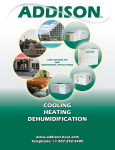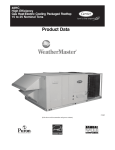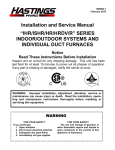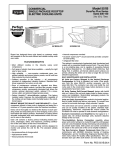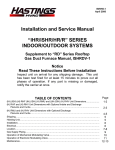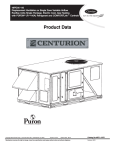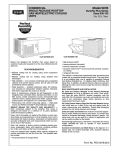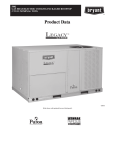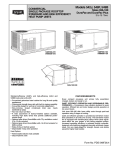Download Bryant 542F Specifications
Transcript
Bryant Air Conditioning COMMERCIAL ROOFTOP PACKAGED HEAT PUMP Model 542F Size 180 15 Tons MODEL 542F DESCRIPTION Model 542F is a high-efficiency, single-package heat pump that has an energy efficiency ratio (EER) of 8.5 and a coefficient of performance (COP) of 3.0 at 47 F outdoor temperature rating point. The 542F has supply- and return-air openings on the bottom of the unit and is designed primarily for rooftop installation on a factory-supplied 14- or 24-in. high roof curb. The air ducts connect to the curb only; therefore, the curb and ductwork may be installed before the unit arrives at the jobsite. A 24-in. high factory-supplied adapter for horizontal supply/ return duct connections to an over-and-under duct configuration is also available for grade level or rooftop installation. ‘‘Variable circuited’’ indoor and outdoor coils allow both coils to operate with parallel circuits when they are performing as evaporators, and with a series of circuits when they are performing as condensers. STANDARD FEATURES FACTORY-ASSEMBLED PACKAGE is a compact, fully selfcontained heating/cooling unit that is prewired, prepiped, and precharged for minimum installation time and expense. TWO RUGGED, SERVICEABLE, SEMI-HERMETIC COMPRESSORS provide two stages of heating and cooling. These compressors are electrically and mechanically independent. COMPRESSOR ISOLATION MOUNTING minimizes vibration (noise) transmission to building. TWO SUCTION-TUBE ACCUMULATORS protect compressors against liquid slugging — permitting operation over wide range of temperatures. CRANKCASE HEATERS AND FILTER DRIERS are standard. HIGH- AND LOW-PRESSURE SAFETY DEVICES are included to prevent major component breakdown when abnormal refrigerant operating conditions occur. INTERNAL AND EXTERNAL PROTECTION is provided against compressor overload and overheat conditions. HIGH-STATIC, BELT-DRIVEN BLOWER with an adjustable motor pulley permits variable airflow rates. An optional motor pulley adjusts the airflow range to meet most applications. WEATHERIZED CABINET of heavy-duty phosphated and zinccoated steel is standard. Baked-on finish is corrosion and fade resistant. VERTICAL CONDENSER AIR DISCHARGE prevents recirculation of hot condenser air and reduces the operating sound level. MANUAL OUTDOOR-AIR DAMPER (standard equipment on units without optional economizer) provides up to 25% outdoor air for ventilation. SUPPLEMENTAL ELECTRIC HEATERS are available as accessory equipment for operation on 208, 230, and 460 v, and are modular in design for easy installation. SINGLE-POINT POWER CONNECTION is provided on units with field-installed electric heaters. Only one power supply with one disconnect switch is required. PROTECTION AS REQUIRED BY NEC (National Electrical Code) for fan motors is factory supplied. TWO-IN. FILTERS are standard. RIGGING HOLES are provided in unit base rails for a 4-point lift to facilitate lifting and moving operations. THERMALLY AND ACOUSTICALLY INSULATED air-handling section provides quieter and more efficient operation. FACTORY-INSTALLED OPTIONS DESCRIPTION AND USAGE Economizer — The economizer will allow a fixed percentage (between 0 and 100%) outdoor ventilation air into the unit any time the indoor fan is running. A dry-bulb changeover thermostat allows up to 100% outdoor air whenever the temperature of the outdoor air alone will adequately provide cooling. If the economizer alone cannot provide enough cooling, then simultaneous economizer and compressor operation will provide the most economical operation. SUGGESTED USE: • To allow a fixed percentage of outdoor air any time the indoor fan is on, or operates in economizer mode if outdoor air can provide cooling, but closes when the indoor fan is off to prevent cold backdrafts and wasted energy. • To reduce energy usage. Use whenever the number of hours of operation at below 55 F is significant. • The damper may be used on either vertical or horizontal applications. Alternate Indoor-Fan Drive — Alternate drive allows operation of the indoor fan at conditions outside the range of the standard factory motor and drive combination. SUGGESTED USE: • When higher static/airflow is required to meet job conditions. Form No. PDS 542F.180.2B Time GuardT Device — Package consists of a control to be field wired into the unit controls, and provides a 5-minute delay in compressor operation between cooling cycles. SUGGESTED USE: • Prevents compressor short cycling when rapid compressor cycles may be a problem. Electric Heat Packages — Each package consists of one or more heater modules. Each module slides into keyed mounting slots in the fan discharge section. SUGGESTED USE: • To provide heat in the unit when required. Economizer — See description listed under Factory-Installed Options Description and Usage section on page 1. Remote Control Panel — The remote control panel accessory consists of a decorative, indoor, wall-mounted panel. The panel contains: 2-stage heat/2-stage cool thermostat with auxiliary changeover, a system switch with HEAT-COOL-AUTO.-OFF settings, a fan switch with ON-AUTO. settings, indicator lights for HEAT-COOL-FAN operation, and 3 unused indicator lights for field use. SUGGESTED USE: • Whenever remote unit operation is desired. Emergency Heat Package — The emergency heat package includes an emergency heat control box containing: emergency heat relays, outdoor thermostat(s), and an emergency heat thermostat subbase with a warning light. SUGGESTED USE: • As auxiliary heating system in the event mechanical heating should be locked out. FIELD-INSTALLED ACCESSORY DESCRIPTION AND USAGE Roof Curbs (Vertical) — Full-perimeter galvanized steel support frame in 14- and 24-in. high designs provides wood nailer to attach roof counter flashing. Insulated basepans in curb are provided to prevent condensation. Ductwork attaches to rails provided in the roof curb. A gasket is provided to form an airand watertight seal between unit and curb. The gasket meets the standards of the NRCA (National Roofing Contractors’ Association). SUGGESTED USE: • Rooftop application for vertical discharge. • Slab-mounted applications when elevation of the unit is necessary. Horizontal Adapters — The adapters are prefabricated, easily field-assembled, and permit full perimeter mounting. Adapters can be installed at the jobsite before unit is installed, eliminating a major leak source. SUGGESTED USE: • Rooftop application for horizontal discharge. • Rooftop applications for horizontal discharge on units where high air delivery cfms are required. Two-Position Damper — Package consists of a low-leak damper assembly. The damper will allow either 0 or 25% outdoor air into the unit any time the evaporator fan is running. When the evaporator fan is off, the damper will be closed. SUGGESTED USE: • Allows a fixed percentage of outdoor air any time the evaporator fan is on, but closes when the evaporator fan is off to prevent cold backdrafts and wasted energy. • The damper may be used on either vertical or horizontal airflow applications. Thermostats and Subbases — Provide staged cooling and heating, automatic (or manual) changeover, fan control, and indicator light. SUGGESTED USE: • To control unit operations. Barometric Relief Package — This package is useful when it is necessary to remove excess pressure from the conditioned space. NOTE: Optional economizer is required with this accessory. Power Exhaust — This package is useful when it is necessary to remove excess pressure from the conditioned space. NOTE: Optional economizer is required with this accessory. SUGGESTED USE: • When the job requires the ability to relieve internal building pressure and pressure losses through the return-air ductwork are greater than 0.20 in. wg. • When the job requires the ability to move large quantities of air to relieve pressure in the conditioned space. Head Pressure Control — Kit consists of an outdoor-air thermostat that permits adequate head pressure control during cooling operation at low outdoor-ambient temperatures. Refer to Trade Prices for more details. SUGGESTED USE: • When cooling at low-ambient outdoor temperatures is desired. CONTENTS Page Model Description . . . . . . . . . . . . . . . . . . . . . . . . . . . . . . . . . 3 ARI Capacity Ratings . . . . . . . . . . . . . . . . . . . . . . . . . . . . . . 3 Dimensional Drawings . . . . . . . . . . . . . . . . . . . . . . . . . . . . . 4-6 Specifications . . . . . . . . . . . . . . . . . . . . . . . . . . . . . . . . . . . . 7 Selection Procedure . . . . . . . . . . . . . . . . . . . . . . . . . . . . . . . 8 Gross Cooling Capacities . . . . . . . . . . . . . . . . . . . . . . . . . . . 9 Integrated Heating Capacities . . . . . . . . . . . . . . . . . . . . . . . 9 Air Delivery . . . . . . . . . . . . . . . . . . . . . . . . . . . . . . . . . . . . . 10 Electric Resistance Heater Data . . . . . . . . . . . . . . . . . . . . . 11 Electrical Data . . . . . . . . . . . . . . . . . . . . . . . . . . . . . . . . . . . 11 Operating Sequence . . . . . . . . . . . . . . . . . . . . . . . . . . . . . . 12 Application Data . . . . . . . . . . . . . . . . . . . . . . . . . . . . . . . . . 13 Typical Field Wiring . . . . . . . . . . . . . . . . . . . . . . . . . . . . . 14,15 Typical Installation . . . . . . . . . . . . . . . . . . . . . . . . . . . . . . . . 15 Engineers’ Specification Guide . . . . . . . . . . . . . . . . . . . . . . 16 2 MODEL DESCRIPTION ODS CATALOG ORDERING NUMBER NOMENCLATURE ARI* CAPACITY RATINGS Total kW 21.0 COOLING Net Capacity Cfm (Btuh) 162,000 6750 EER 8.5 HEATING-HIGH TEMP Total Total Capacity COP kW (Btuh) 166,000 17.5 2.8 LEGEND COP db EER ESP kW wb — — — — — — HEATING-LOW TEMP Total Total Capacity COP kW (Btuh) 92,000 14.3 1.8 Cooling ratings are net values, reflecting the effects of circulating fan heat. Ratings are based on: ESP: −.35 in. wg Cooling Standard: 80 F db, 67 F wb indoor coil entering-air temperature and 95 F outdoor coil entering-air temperature. High-Temp Heating Standard: 70 F db indoor coil entering-air temperature and 47 F db, 43 F wb outdoor coil entering-air temperature. Low-Temp Heating Standard: 70 F db indoor coil entering-air temperature and 17 F db, 15 F wb outdoor coil entering-air temperature. Coefficient of Performance Dry Bulb Energy Efficiency Ratio External Static Pressure Kilowatts Wet Bulb *Air Conditioning and Refrigeration Institute. NOTE: 542F180 units are rated in accordance with ARI Standard 340. 3 DIMENSIONAL DRAWING — BASE UNIT NOTE: Space required for service clearance and airflow: Allow 68-09 above the unit; 78-09 on filter access panel end; and 48-09 on remaining sides of unit. 4 DIMENSIONAL DRAWING — HORIZONTAL AND VERTICAL ROOF CURBS AND HORIZONTAL ADAPTER NOTE: To prevent the hazard of stagnant water build-up in the drain pan of the indoor-air section, unit can only be pitched as shown. ACCESSORY CURB DESCRIPTION PACKAGE NO. HEIGHT 18-29 Standard Curb — 308450-201 (305) 149 High Standard Curb 28-09 308450-202 Units Requiring (610) for High Installation 308450-203 28-09 (610) 389210-201 18-119 (584) Horizontal Roof Curb Pre-Assembled, High-Static Horizontal Adapter ‘‘A’’ ‘‘B’’ ‘‘C’’ — — — — — — 58-69 08-21⁄29 (1676) (64) 18-69 (457) 68-29 08-61⁄49 18-25⁄89 (1880) (159) (371) LEGEND COMP SECT. — Compressor Section NOTES: 1. Roof curb accessory is shipped unassembled. 2. Insulated panels, 1⁄2-in. thick neoprene-coated, 2 lb density. 3. Dimensions in ( ) are in millimeters. 4. Direction of airflow. 5. Roof curb: 18 gage steel. 6. Attach all ductwork to roof curb. 5 DIMENSIONAL DRAWING — HORIZONTAL ADAPTER INSTALLATION NOTE: 389210-201 is a fully factory preassembled horizontal adapter which includes an insulated high static regain transition duct and substantially improves fan static performance. 6 SPECIFICATIONS UNIT 542F OPERATING WT (lb) Unit with Economizer Roof Curb COMPRESSOR Quantity...Type Oil (oz) Capacity Steps REFRIGERANT (Capillary Control) Charge (lb) Sys 1*, Sys 2 OUTDOOR COIL Rows Fins/in. Total Face Area (sq ft) OUTDOOR-AIR FAN Nominal Cfm Quantity...Diameter (in.) Motor Hp (1100 Rpm)...kW Input INDOOR COIL Total Face Area (sq ft) Rows...Fins/in. INDOOR-AIR FAN Quantity...Size (in.) Nominal Cfm Rpm Range Max Allowable Rpm Fan Pulley Pitch Diameter (in.) Motor Pulley Pitch Diameter (in.) Motor Frame Size Belt, Quantity...Type Speed Change per Full Turn of Moveable Pulley Flange (Rpm) Moveable Pulley Maximum Full Turns from Closed Position Factory Setting — Full Turns Open Factory Speed Setting (Rpm) 180 (15 TON) 1760 1870 200 Semi Hermetic, 4 Cyl 2...06D 112 ea 0, 50, 100 R-22 16.8, 16.8 Copper Tube, Aluminum Plate Fins 3 13.6 22.2 Propeller Type, Direct Drive 12,000 2...26 1...2.2 Copper Tube, Aluminum Plate Fins 18.3 3...14.4 Centrifugal, Adjustable Belt Drive 2...10 x 10 6000 916-1186 1158-1428 1550 6.4 3.4-4.4 4.3-5.3 56 — 1...A44 1...B45 54 Std Alt Std Alt Std Alt Std Alt 5 5 916 1158 3...3500 Std Alt Motor (1750 Rpm), Hp...Max Watts HIGH-PRESSURE SWITCH Cutout (psig) Reset (psig) LOSS-OF-CHARGE/LOW-PRESSURE SWITCH (Liquid Line) Cutout (psig) Reset (psig) INDOOR-AIR FILTERS, Type Quantity...Size (in.) 426 320 7 22 10% Efficient — Throwaway Fiberglass 4...20 x 20 x 2 4...16 x 20 x 2 *System 1 consists of upper portion of outdoor coil and lower portion of indoor coil, and System 2 consists of the upper portion of the indoor coil and the lower portion of the outdoor coil. 7 SELECTION PROCEDURE (with example) IV DETERMINE FAN SPEED AND POWER REQUIREMENTS AT DESIGN CONDITIONS: Before entering the Air Delivery table calculate the total static pressure required based on unit components. From the given and the Pressure Drop tables, find: External static pressure 0.75 in. wg Economizer 0.07 in. wg Electric heat 0.09 in. wg Total static pressure 0.91 in. wg I DETERMINE COOLING AND HEATING REQUIREMENTS AT DESIGN CONDITIONS: Given: Required Cooling Capacity (TC) . . . . . . . . . 172,000 Btuh Sensible Heat Capacity (SHC) . . . . . . . . . . 133,000 Btuh Required Heating Capacity . . . . . . . . . . . . . 170,000 Btuh Outdoor Entering-Air Temperature . . . . . . . . . . . . . . 95 F Indoor Entering-Air Temperature (Cooling) . . . . . . . . . . . . . 80 F entering dry bulb (edb) 67 F entering wet bulb (ewb) Outdoor Coil Entering Air Temperature (Heating) . . . 0° F Indoor-Air Winter Design Temperature . . . . . . . . . . . 70 F Evaporator Air Quantity . . . . . . . . . . . . . . . . . . . 6000 cfm External Static Pressure (ESP) . . . . . . . . . . . 0.75 in. wg Electrical Characteristics (V-Ph-Hz) . . . . . . . . . . 230-3-60 Enter the Air Delivery table on page 10. At 6000 cfm, the standard motor with alternate drive will deliver up to 1.40 in. wg static pressure and 3.82 brake horsepower (bhp). This will adequately handle job requirements. V DETERMINE NET CAPACITIES: Capacities are gross and do not include the effect of indoor-fan motor (IFM) heat. Determine net cooling capacity as follows: Convert bhp to Watts using the formula found in the note following the Air Delivery table on page 10. For example: 746 x Bhp Watts = Motor Efficiency 746 x 3.82 Watts = .81 Watts = 3518 II SELECT UNIT BASED ON REQUIRED COOLING CAPACITY: Enter Gross Cooling Capacities table on page 9 at outdoor entering-air temperature of 95 F, indoor air entering at 6000 cfm and 67 F ewb. The 542F unit will provide a total cooling capacity of 185,400 Btuh and a sensible heat capacity of 146,700 Btuh. For indoor-air temperature other than 80 F edb, calculate sensible heat capacity correction, as required, using the formula found in Note 3 following the cooling capacities table. NOTE: Unit ratings are gross capacities and do not include the effect of indoor-fan motor heat. To calculate net capacities, see Step V. Net capacity = Gross capacity – IFM heat = 185,400 Btuh – (3518 Watts x 3.413 Btuh/Watts) = 185,400 Btuh – 12,007 Btuh = 173,393 Btuh III SELECT ELECTRIC HEAT: Enter the Integrated Heating Capacities table on page 9 at 6000 cfm. At 70 F return air and 0° F air entering outdoor coil, the integrated heating capacity is 67,000 Btuh. (Deductions for outdoor-coil frost and defrosting have already been made. No correction is required.) The required heating capacity is 170,000 Btuh. Therefore, 103,000 Btuh (170,000 – 67,000 Btuh) additional electric heat is required. Determine additional electric heat capacity in kW. 103,000 Btuh = 30.2 kW of heat required. 3413 Btuh/kW Enter the Electric Resistance Heater Data table on page 11 for 542F at 230-3-60. The 31.0-kW heater at 230 v most closely satisfies the heating required. 31.0 kW x 3413 Btuh/kW = 105,800 Btuh Total unit heating capacity at 0° F is 172,800 Btuh (105,800 + 67,000). Net sensible capacity = 146,700 Btuh – 12,007 Btuh = 134,693 Btuh Determine net heating capacity as follows: Net capacity = Gross capacity + IFM heat + Electric heat capacity = 67,000 Btuh + 12,007 Btuh + 105,800 Btuh = 184,807 Btuh 8 GROSS COOLING CAPACITIES UNIT 542F180 Outdoor Air (F) Indoor Air Cfm BF 5500 .07 6000 .08 7000 .09 Ewb (F) 62 67 72 62 67 72 62 67 72 85 Capacity MBtuh Total Sensible 176.1 169.7 191.4 142.6 207.1 111.2 180.0 176.8 194.3 148.9 209.7 115.2 186.3 184.6 198.4 158.6 213.3 121.3 Compr kW 13.9 14.6 15.3 14.0 14.6 15.2 13.8 14.3 15.0 95 Capacity MBtuh Total Sensible 167.2 165.4 182.7 139.9 199.8 109.4 171.4 161.9 185.4 146.7 202.3 113.3 178.3 178.3 189.4 156.6 205.9 119.7 Compr kW 14.9 15.6 16.4 14.9 15.6 16.4 14.8 15.4 16.2 LEGEND BF — Bypass Factor Edb — Entering Dry Bulb Ewb — Entering Wet Bulb kW — Compressor Power Input SHC — Sensible Capacity NOTES: 1. Direct interpolation is permissible. Do not extrapolate. 2. The following formula may be used: sensible capacity (Btuh) tldb = tedb − 1.10 x cfm tlwb = Wet-Bulb temperature corresponding to enthalpy of air leaving indoor coil (hlwb) total capacity (Btuh) hlwb = hewb − 4.5 x cfm Where: hewb = Enthalpy of air entering indoor coil. 105 Capacity MBtuh Total Sensible 158.0 157.9 171.4 130.1 189.3 106.0 162.5 162.5 173.9 143.0 191.6 110.2 169.1 169.1 178.0 153.1 195.2 117.0 Compr kW 16.0 16.6 17.6 16.1 16.6 17.5 16.0 16.4 17.3 115 Capacity MBtuh Total Sensible 148.4 148.4 159.0 130.8 176.9 102.0 152.7 152.7 161.5 137.4 179.0 106.3 158.9 158.9 165.4 147.5 182.6 113.2 Compr kW 17.7 17.7 18.6 17.3 17.7 18.6 17.2 17.5 18.4 3. The SHC is based on 80 F edb temperature of air entering indoor coil. Below 80 F edb, subtract (correction factor x cfm) from SHC. Above 80 F edb, add (correction factor x cfm) to SHC. BF 79 81 .03 .10 .15 .20 1.06 .98 .93 .87 ENTERING AIR DRY-BULB TEMP (F) 78 77 76 75 Under 75 Over 85 82 83 84 85 Correction Factor 2.11 3.17 4.33 5.28 1.96 2.94 3.92 4.91 use formula 1.85 2.78 3.71 4.63 shown below 1.74 2.62 3.49 4.36 Interpolation is permissible. Do not extrapolate. Correction Factor = 1.10 x (1 − BF) x (edb − 80). INTEGRATED HEATING CAPACITIES OUTDOORAIR TEMP (F db at 70% RH) 60 50 40 30 20 10 0 −10 −20 INTEGRATED TOTAL POWER CAPACITY INPUT (kW) (MBtuh)* Indoor-Air Temp (F edb) 55 70 80 55 70 80 Indoor Airflow (cfm) 5500 218 208 198 18.5 19.6 20.2 189 180 171 16.9 17.8 18.3 163 155 147 15.5 16.3 16.8 121 115 109 14.5 15.3 15.8 105 100 95 13.7 14.4 14.8 89 85 81 12.7 13.4 13.8 69 66 63 11.5 12.1 12.5 51 49 47 10.4 10.9 11.2 44 42 40 9.2 9.7 10.0 INTEGRATED TOTAL POWER CAPACITY INPUT (kW) (MBtuh)* Indoor-Air Temp (F edb) 55 70 80 55 70 80 Indoor Airflow (cfm) 6000 221 210 200 18.5 19.5 20.1 192 183 174 17.0 17.9 18.4 165 157 149 15.8 16.6 17.1 122 116 110 14.7 15.5 16.0 107 102 97 14.1 14.8 15.2 91 87 83 13.3 14.0 14.4 70 67 64 11.7 12.3 12.7 53 50 48 10.5 11.1 11.4 46 44 42 9.4 9.9 10.2 LEGEND ARI — Air Conditioning and Refrigeration Institute Edb — Entering Dry Bulb kW — Total Unit Power Input — Includes compressors, outdoor-fan motors, and indoor-fan motor. Indoor-fan motor heat based on unit operating at cfm shown and external static pressures (ESP) of 0.35. Conversion formula: Btuh = kW x 3413 *Includes effect of defrost and indoor-fan motor heat at ARI conditions. 9 INTEGRATED TOTAL POWER CAPACITY INPUT (kW) (MBtuh)* Indoor-Air Temp (F edb) 55 70 80 55 70 80 Indoor Airflow (cfm) 7000 230 219 208 19.6 19.6 20.2 201 191 181 17.2 18.1 18.6 174 166 158 16.1 16.9 17.4 129 123 117 15.0 15.8 16.3 114 109 104 14.4 15.2 15.7 99 94 89 13.8 14.5 14.9 80 76 72 12.0 12.6 13.0 61 58 55 10.9 11.5 11.8 54 51 48 9.9 10.4 10.7 AIR DELIVERY CFM 5500 6000 6500 7000 0.20 Rpm Bhp 923 1.88 993 2.36 1064 2.92 1136 3.55 0.40 Rpm Bhp 1002 2.13 1066 2.63 1131 3.21 1199 3.86 EXTERNAL STATIC PRESSURE (in. wg) 0.60 0.80 1.00 1.20 Rpm Bhp Rpm Bhp Rpm Bhp Rpm Bhp 1075 2.35 1143 2.58 1208 2.80 1271 3.01 1135 2.88 1200 3.12 1260 3.36 1320 3.59 1197 3.48 1259 3.74 1318 4.00 — — — — — — — — — — LEGEND Bhp — Brake horsepower 1.60 Rpm Bhp 1394 3.49 — — — — — — 5. Electric heater pressure drop must be accounted for in fan rpm and bhp section (see Static Pressure Losses table on page 11). 6. Minimum cfm for units with electric resistance heat: 5650 cfm. Converting Bhp to Watts: Bhp x 746 Watts input = Motor Efficiency Approximate Motor Efficiency: .81 NOTES: 1. 1.40 Rpm Bhp 1334 3.24 1378 3.82 — — — — — Alternate drive required. 2. indicates maximum capability of standard drive. 3. Maximum allowable fan speed is 1550 rpm. 4. Fan performance is based on wet coil and clean 2-in. filters. Casing losses have been deducted. AIR DELIVERY USING ACCESSORY POWER EXHAUST HORIZONTAL SUPPLY/RETURN FAN PERFORMANCE WITH 389210-201 HIGH STATIC REGAIN ADAPTER NOTE: The 389210-201 horizontal supply/return adapter accessory improves 542F180 fan performance by increasing external static pressure by amount shown above. NOTE: The 389210-201 high static regain adapter accessory may be used to provide horizontal supply/return. 10 INDOOR FAN DRIVE DATA FAN RPM Turns Open 2 3 1079 1029 1321 1267 TYPE 0 1186 1428 Std Alt 1 1132 1374 ELECTRIC RESISTANCE HEATER DATA 4 970 1213 HEATER kW* Unit Voltages 208 230 460 26 31 32 42 52 55 56 69 80 5 916 1158 HEATING STAGES % HEAT PER STAGE MAXIMUM STAGES† 2 2 2 50/50 33/67 50/50 2 3 4 *Field-installed accessory only. †Maximum number of stages using accessory outdoor-air thermostats. NOTE: Heater kW is based on heater voltage of 240 v or 480 v. If power distribution voltage to unit varies from rated heater voltage, heater kW will vary accordingly. STATIC PRESSURE LOSSES* (in. wg) ACCESSORY/FIOP UNIT VOLTAGE 208/230-3-60 Electric Heaters 460-3-60 Economizer All CFM kW 26/31 42/52 56/69 32 55 80 — 3500 .04 .05 .06 .04 .05 .06 .02 4000 .05 .06 .07 .05 .06 .07 .03 4500 .06 .07 .08 .06 .07 .08 .04 5000 .07 .08 .10 .07 .08 .10 .05 5500 .08 .10 .12 .08 .10 .12 .06 6000 .09 .12 .15 .09 .12 .15 .07 6500 .11 .14 .17 .11 .14 .17 .08 7000 .12 .16 .20 .12 .16 .20 .09 FIOP — Factory-Installed Option *Static pressure losses must be added to external static pressure before entering Air Delivery table. ELECTRICAL DATA V-PH-HZ VOLTAGE RANGE COMPRESSOR (each) OUTDOOR FAN MOTOR Qty FLA INDOOR FAN MOTOR Hp FLA Min Max RLA LRA 208/230-3-60 187 254 31.3 137 2 7.7 3.0 10.5 460-3-60 414 508 15.7 62 2 3.3 3.0 4.8 LEGEND FLA LRA MCA MOCP RLA — — — — — ELECTRIC HEAT kW† — 26/31 42/52 56/69 — 32 55 80 FLA — 72/ 82 117/135 156/180 — 39 66 96 POWER SUPPLY* MCA 97/ 97 186/199 243/231 252/276 47 96 113 143 MOCP 125/125 200/200 250/250 300/300 60 100 125 150 *Fuse only. †Heater capacity (kW) is based on heater voltage of 240 v or 480 v. If power distribution voltage to unit varies from rated heater voltage, heater kW will vary accordingly. Heaters are field-installed only. Full Load Amps Locked Rotor Amps Minimum Circuit Amps Maximum Overcurrent Protection Rated Load Amps 11 OPERATING SEQUENCE Cooling, Units With Economizer Outdoor Air Enthalpy Above Set Point — Indoor and outdoor fans and compressors energize when there is a call for cooling. The economizer damper moves to VENT position. Outdoor Air Enthalpy Below Set Point — Indoor fan starts and economizer damper opens fully on a first-stage call for cooling. Compressor remains off. Compressor is energized and mechanical cooling integrates with economizer cooling upon a second stage call for cooling. Economizer damper modulates when mixed-air temperature is below mixed-air thermostat setting. A freeze protection thermostat is located on the indoor coil. It detects ice build-up and turns off the compressor, thus allowing the coil to clear. Once ice melts, the compressor can be reenergized. Heating, Units With Economizer — Outdoor-air damper stays at VENT position while indoor-air fan runs. NOTE: If fan switch is at ON position, and room thermostat is satisfied, damper goes to ventilation position. Cycle-LOC™ Protection — If unit operation is interrupted by an open high-pressure switch, low-pressure switch, indoor-coil freezestat, or by compressor internal line-break device (overcurrent or overtemperature), and compressor is calling for either cooling or heating, Cycle-LOC simultaneously locks out unit and lights a warning light on the thermostat. Restart the unit by manually turning room thermostat to OFF and then ON position. If any of the protective devices opens again, the unit continues to lock out until corrective action is taken. NOTE: If the unit fails to operate due to compressor overcurrent condition, restart by manually resetting circuit breakers at the unit. Restart cannot be accomplished at room thermostat. BASE UNIT OPERATING SEQUENCE Cooling, Units Without Economizer — With unit main power on, set thermostat at COOL position and desired room temperature. Set fan switch at AUTO. (on demand) or ON (continuous) position. On a rise in room temperature, cooling contact no. 1 in the thermostat closes, energizing compressor no. 1 contactor on all units. Compressor no. 1, indoor-fan motors, and outdoor-fan motors start. Compressor no. 1 cycles on demand of thermostat to satisfy room conditions. With an additional rise in room temperature, cooling contact no. 2 in the thermostat closes, energizing compressor contactor no. 2. Compressor no. 2 starts. Compressor no. 2 cycles on demand of the thermostat to satisfy room conditions. Heating, Units Without Economizer — Turn power on and set thermostat at HEAT position and desired temperature. Set fan at AUTO. (on demand) or ON (continuous) position. On a drop in room temperature, heating contact no. 1 in the thermostat closes, energizing compressor contactor no. 1 and reversing valve, and starting compressor no. 1. Indoor blower contactors and outdoor-fan contactors energize at the same time for heat pump cycle. When thermostat second-stage heating contacts close, compressor contactor no. 2 energizes and compressor no. 2 starts. Units have a built-in electric resistance heat lockout through the defrost thermostat. Above 40 F (approximate) outdoor temperature, electric resistance heat is locked out and second-stage heat is from compressor no. 2. Below 40 F (approximate) ambient temperature, when the thermostat first-stage heating contacts close, compressor contacts no. 1 and no. 2 energize sequentially through a time delay. Both compressors (no. 1 and no. 2) are brought on to satisfy heating requirements. On a further drop in room temperature (outdoor ambient below 40 F), the thermostat second-stage heating contacts close, energizing the electric resistance heat contactor and starting second-stage heat. Electric heaters with 2 or more contactors can have outdoor thermostats wired into the control circuit for additional staging. Automatic Changeover — When the system selection switch is set at AUTO. position, unit automatically changes from heat operation to cooling operation when the temperature of the conditioned space rises to cooling lever setting. When the temperature of the conditioned space falls to heating lever setting, unit automatically changes from cooling to heating operation (with a 3 F deadband in between). Continuous Air Circulation — Turn unit power on. Set system control at OFF position. Set fan switch at ON position. The indoor-fan contactor is energized through the thermostat switch and the indoor fan runs continuously. Defrost Cycle — The defrost thermostat on the outdoor coil activates a defrost timer which energizes electric resistance heaters and deenergizes reversing valve relays and outdoor-fan motors. When the defrost thermostat is satisfied or when 10 minutes have elapsed, reversing valve solenoids energize and electric heaters deenergize. The defrost timer will energize the electric heaters every 90 minutes, if necessary. The defrost thermostat, in conjunction with a time-delay relay, prevents electric heat operation above an ambient temperature of approximately 40 F (depending on coil frost conditions). If defrost thermostat closes, time-delay relay energizes, closing compressor contactor no. 2. Both compressors now operate from W1, and W2 controls electric heat. ACCESSORY OPERATING SEQUENCES Emergency Heat — If compressor is inoperative due to a tripped safety device (high-pressure, low-pressure, indoor-coil freezestat, overcurrent, or overtemperature), Cycle-LOC™ locks out compressor and lights a warning light on the room thermostat. When switch is on (thermostat is moved to the EM HT position), compressor circuit and outdoor thermostats are bypassed, and second stage of thermostat energizes indoor blower and electric resistance heaters. Time GuardT Control Circuit — The accessory Time Guard control circuit provides a 5-minute delay of compressor restart after desired space temperature has been attained and room thermostat has shut down the compressor. Assuming that compressor has been off for at least 5 minutes due to room thermostat action, Time Guard control circuit sequence is as follows: With fan selector switch at AUTO. position and a call for cooling from the room thermostat, indoor blowers start immediately; outdoor-air fans and compressor start 15 seconds later. When room thermostat is satisfied, compressor shuts off. The Time Guard control circuit timer motor then runs for 4 minutes and 45 seconds, at which point its internal switches reset so normal sequence can begin again. The base unit contains, as standard equipment, a factoryinstalled Cycle-LOC compressor protection device. If overload protector causes the compressor to shut off, compressor remains locked out until control circuit is manually reset. Reset manually by moving system selector lever on room thermostat to OFF position momentarily and then returning it to cooling position. After a standard 5-minute Time Guard control circuit delay, the compressor can restart. 12 APPLICATION DATA 1. Ductwork must be attached to the curb on all units. Interior installation may proceed before unit is set in place on roof. Field-fabricated concentric ductwork may be connected as shown below. 2. Factory- and field-installed electric heat allows single power entry to unit for both heating and cooling. Values shown for minimum circuit amps (MCA) and maximum overcurrent protection (MOCP) in the Electrical Data table on page 11 apply to factory- or field-installed heaters. 3. Indoor coil is draw-thru configuration. Condensate trap (minimum 4 in. deep) must be field-installed prior to start-up on cooling cycle. Install plug in condensate drain on opposite side of unit from trap. 4. When return-air ductwork systems are used, return horizontal static pressures should be limited to 0.4 in. wg. 5. Cfm and other values indicated throughout this literature illustrate the operating range of the equipment. Operation outside these limits is not recommended. 6. When use is required with emergency heat, in addition to accessory emergency-heat components, field-supplied 7. 8. 9. 10. 11. emergency heat switch (DPST toggle switch) must be used. Emergency heat subbase cannot be used with the remote control panel. Units are designed to operate at outdoor temperatures down to 40 F. At temperatures below 40 F, accessory head pressure control device will permit operation at outdoor temperatures as low as −20 F. All roof curb and adapter installations must be counterflashed to prevent water leakage. Select unit based on cooling only. Do not select heat pumps on heating capacity. Add auxiliary resistance heat if required. Electric power may be brought to unit within curb perimeter through fittings provided in basepan. Provide power supply in accordance with local codes. Branch circuit protection to unit must be provided by fuses no larger than MOCP shown in Electrical Data table on page 11. The 24-v control wiring to thermostat is NEC (National Electrical Code) Class II. Shaded area indicates block-off panels. NOTE: Do not drill in this area, damage to basepan may result in water leak. NOTE: Dimensions A, A8 and B, B8 are obtained from fieldsupplied ceiling diffuser. Concentric Duct Air Distribution Concentric Duct Details OPTIONS AND ACCESSORIES ITEM Alternate Drive Integrated Economizer Electric Heater Emergency Heat Package Roof Curb (Vertical and Horizontal) Horizontal Adapter Remote Control Panel Thermostats and Subbases Time GuardT Control Device Power Exhaust Two-Position Damper Barometric Relief Damper Head Pressure Control OPTION* X X *Factory Installed. †Field Installed. 13 ACCESSORY† X X X X X X X X X X X X TYPICAL FIELD WIRING 14 LEGEND FOR TYPICAL FIELD WIRING AHA — Adjustable Heat Anticipator BKR W/AT — Breaks With Amp Turns C — Contactor CB — Circuit Breaker CC — Cooling Compensator CLO — Cooling Lockout CLS — Cooling Lockout Switch CR — Control Relay CT — Current Transformer DFR — Defrost Relay DM — Damper Motor DR — Damper Relay EC — Enthalpy Control FPT — Freeze Protection Thermostat HC — Heater Contactor HPS — High-Pressure Switch HR — Heater Relay IFC — Indoor Fan Contactor IP — Internal Protector L — Light LOR — Lockout Relay LPS — Low-Pressure Switch MAT — Mixed Air Thermostat PL — Plug Assembly PRI — Primary RVR — Reversing Valve Relay SW TB TC TH TRAN — — — — — Switch Terminal Block Thermostat, Cooling Thermostat, Heating Transformer Terminal (Marked) Terminal (Unmarked) Terminal Block Splice Splice (Marked) Factory Wiring Field Control Wiring Field Power Wiring Accessory Wiring or Optional Wiring Accessory To indicate common potential only; Not to represent wiring. TYPICAL INSTALLATION NEC — National Electrical Code 15 ENGINEER’S SPECIFICATION GUIDE GENERAL: Furnish and install a self-contained, air-to-air electric heat pump rooftop unit with supply- and return-air connections off the bottom of the unit, mounted on a full perimeter, fieldassembled roof curb. The rooftop unit shall be completely factory-assembled and tested, and shall include compressors, indoor coil, outdoor coil, fans and motors, interconnecting wiring, prewired control panel, filters, and other necessary components mounted in a corrosion-resistant all-weather cabinet. Unit shall be shipped fully charged with oil and R-22 refrigerant. COOLING CAPACITY: Total net cooling capacity of the unit shall be Btuh or greater, and sensible capacity shall be Btuh or greater at conditions of ft3/min evaporator entering air of 67 F wet bulb, 80 F dry bulb, and condenser entering air temperature of 95 F dry bulb. Equipment must have an EER of 8.5 or higher at this condition. HEATING CAPACITY: Total heating capacity shall be Btuh or greater (integrated rating) when rated at F dry bulb outdoor ambient with ft3/min and F air entering indoor (heating) coil. The equipment must have a minimum heating COP of 3.0 at 47 F dry bulb outdoor ambient (high temp) and 2.1 at 17 F dry bulb outdoor ambient (low temp). Supplemental heat of kW shall be provided to satisfy heat loss at winter design conditions. The coefficient of performance (COP) must be 2.9 or better at 47 F. CABINET: The cabinet shall be constructed of heavy-gage zinccoated galvanized steel with baked enamel finish. This finish shall exceed the U.S. Army Corps of Engineers standards without peeling, cracking, or rusting beyond 1⁄8 in. on a scratch mark when subjected to 5% salt spray solution at 95 F for 1000 hours. The cabinet shall be constructed such that one-piece top is used for the entire indoor air-handling section to ensure watertightness. Two-in. replaceable filters mounted internally shall be supplied. COMPRESSORS: Compressors shall be of the serviceable, semi-hermetic type, with crankcase heaters and suitable vibration isolators. A separate refrigerant circuit shall be provided for each compressor. An automatic resetting circuit shall be provided to prevent rapid compressor cycling. OUTDOOR SECTION: The outdoor coil shall be constructed of aluminum plate fins mechanically bonded to seamless copper tubes. Outdoor fans shall be direct-driven, slow-speed propeller type for quiet operation and shall be mounted for vertical discharge. The outdoor motors shall be protected as required by NEC and be supplied with rainshields. Bryant Air Conditioning Copyright 1995 Carrier Corporation INDOOR SECTION: Indoor coil shall be constructed of aluminum plate fins mechanically bonded to seamless copper tubes. Indoor blower shall be of centrifugal type, forward curved. The blower shall be belt-driven by means of an adjustable pitch pulley, permitting a variation of airflow by means of blower speed adjustment. Blower motor shall be electrically protected as required by NEC. Blower motor shall be mounted on the adjustable base, allowing for proper alignment and tension. The steel shaft shall rotate in prelubricated bearings. CONTROL CIRCUIT: The unit control panel shall be prewired in the unit casing furnished with a 24-v control transformer, highand low-pressure switches, compressor, outdoor and indoor fan motor contactors, as well as other protective devices. The defrost circuit shall be time and temperature initiated. A 90-minute timer shall energize the defrost cycle only if the coil temperature indicates a frost condition. Defrost shall terminate after 10 minutes of operation, or when a satisfactory coil temperature is achieved to minimize defrost operating time. APPROVALS: The unit shall be ETL tested and certified. All wiring shall be in accordance with NEC, and units shall meet ASHRAE Standard 62. The unit shall be rated in accordance with ARI Standard 340. Units shall be designed to conform to NRCA standards. Insulation and adhesive shall meet NFPA 90A requirements for flame spread and smoke generation. OPTIONS: Factory-installed integrated economizer shall include all hardware and controls to provide cooling using outdoor air alone, or in conjunction with mechanical cooling. Dampers shall be low leakage type, not to exceed 2% leakage at 1.0 in. wg pressure differential. Economizer shall be capable of introducing up to 100% outdoor air and shall be equipped with a gravity relief damper. Economizer controls shall be dry-bulb type. On all units where the factory-installed economizer is not chosen, the factory-installed manual outdoor-air damper shall be included. In addition, a factory-installed alternate indoor-fan drive is available. ACCESSORIES: Field-installed accessories shall include: Economizer, vertical and horizontal roof curbs (14 or 24 in.), horizontal adapter, two-position damper, Time GuardT short cycle circuit protection, thermostats and subbases, electric heaters, barometric relief damper, power exhaust, emergency heat, remote control panel, and head pressure control device. SPECIFICATIONS SUBJECT TO CHANGE WITHOUT NOTICE UNIT MUST BE INSTALLED IN ACCORDANCE WITH INSTALLATION INSTRUCTIONS Printed in U.S.A. 5/95 CATALOG NO. BY-3254-205
















